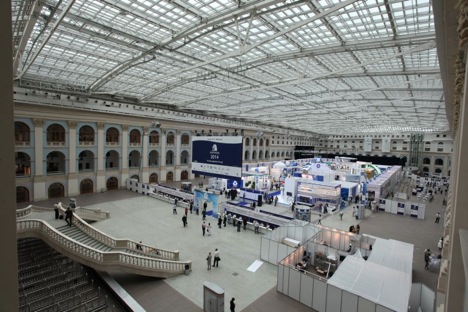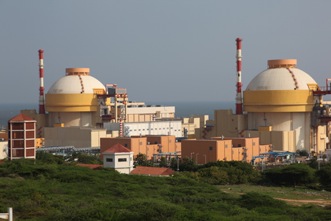Indo-Russian nuclear cooperation reviewed at Atomexpo-2014

Atomexpo is a major exhibition and business platform for conducting meetings and negotiations between the worldwide leaders of the nuclear power industry. Source: Atomexpo
The full scope of Indo-Russian cooperation in the field of civil nuclear energy was reviewed at the Atomexpo-2014 exhibition that opened in Moscow on Monday, June 9. Representatives from the Nuclear Power Corporation of India and India’s Department of Atomic Energy are taking part at the 3-day conference being organised by Rosatom.
India asked for enhanced security measures at the Kudankulam Nuclear Power Plant (KNPP), according to PTI news. “We had received a request from India for enhanced safety measures,” the news agency quoted V Asmolov, first deputy general of Rosenergoatom, the Russian nuclear power station operations subsidiary of Rosastom, as saying. “Of course India had to pay more for such kind of system. The Kudankulam plants have four channels of safety system,” Asmolov said.
According to the PTI report, Asomolov added that the existing safety channels were sufficient for an “immediate stopping of chain reaction in case of crisis.” He said, “The system will ensure water supply for cooling of the reactor even if there is a black out for 24 hours.”
Reprocessing of spent nuclear fuel
Russia also said India could reprocess the spent nuclear fuel from KNPP. “Spent fuel is important to India and it has its own facility with a highly qualified staff,” PTI quoted Anzhelika Khaperskaya, chief manager of spent nuclear fuel system creation wing of Rosatom, as saying. “We don’t have the responsibility of the spent fuel from the Kudankulam plant and India can reprocess its spent fuel or even store it.”
India has three operating processing plants that can reprocess spent nuclear fuel based on solvent extraction process.
A plant Trombay reprocesses spent fuel from research reactors with the capacity of 60 tonnes per year. Plants at Tarapur and Kalpakkam process off-site fuels from Pressurized Heavy Water Reactors with operating capacity of 100 tonnes per year each. Additional re-processing facilities are also being set up with the active participation of the Indian industry.
Countries like the US were vary of India’s capability to process spent nuclear fuel, worried that it could be used in the country’s nuclear weapons programme. The Indo-US nuclear deal negotiations were slowed down on account of American concerns over the Indian use of spent nuclear fuel.
All rights reserved by Rossiyskaya Gazeta.
Subscribe
to our newsletter!
Get the week's best stories straight to your inbox

